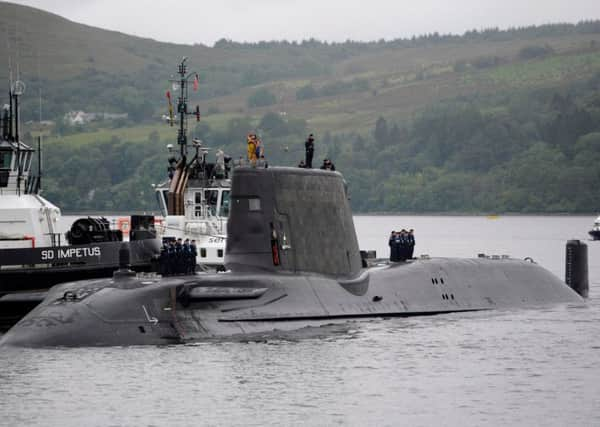Leaders: Labour must get act together on Trident


The rebuilding process is already under way and the party needs to adopt a radical approach if it is to win back the ground it has lost to the SNP over the years. Its decline is such that it would now be a considerable achievement for Labour just to thwart the SNP’s ambition of winning an unprecedented second Holyrood majority at next May’s Scottish election – but the latest polling evidence suggests this is unlikely.
Kezia Dugdale made a bold move recently when she said that Scottish MPs and MSPs would be allowed to vote for independence in the event of another referendum. It prompted some criticism from the party’s old guard. But an estimated third of traditional Labour supporters voted Yes in the referendum and appear to be sticking with the SNP.
Advertisement
Hide AdAdvertisement
Hide AdThe truth is that Ms Dugdale’s approach is just an acceptance of the new political landscape in Scotland. Labour must command support in any future referendum by winning the arguments rather than with a blanket call to arms among its backers.
Ms Dugdale has made it clear that she – not new UK leader Jeremy Corbyn – will be making policy in Scotland, along with her deputy, Alex Rowley. After former Scottish leader Johann Lamont’s complaints that the party was being treated as a “branch office” by London, a robust approach to any hint of interference in Scottish policy-making from south of the Border is understandable.
But there is nonetheless a need for the party to present a united policy front on the major issues. Divided parties seldom prosper and disputes between Scotland and England are only likely to play into the hands of the SNP.
That’s why Mr Corbyn’s statement that Labour may not have a settled position on the UK’s Clyde-based Trident nuclear weapons system by next May is a worrying revelation.
This is of huge interest in Scotland, although its easy to overlook the fact that public opinion is split down the middle, with varying polls indicating small majorities either in favour or against.
Mr Corbyn’s opposition to the nuclear deterrent is all too well known, while the Scottish leader is a self-declared multi-lateralist who only wants to see it phased out if other, perhaps more adversarial, nuclear nations adopt a similar reduction in their arsenal. With thousands of navy jobs at the Faslane base reliant on the Trident submarines, it is understandable that Scots will be keen to see a clear position on the issue from the party which is still the main opposition north of the Border.
Senior Nationalists unsurprisingly seized on the split, branding Labour “divided and unelectable” over the split on the issue.
Ms Dugdale and Mr Corbyn must find a settled position for the party to take into next year’s Holyrood campaign. Without this, the prospect of arresting years of decline and delivering a much-needed revival appear increasingly dim.
A chilling and dangerous threat
Advertisement
Hide AdAdvertisement
Hide AdThe notion that a 15-year-old boy from Blackburn, Lancashire, would be behind a plot to cause death and destruction by attacking the Anzac parade in Australia makes for chilling reading.
It is difficult to understand why a teenager sitting in his bedroom would want to attack a solemn event commemorating the sacrifice of Australian and New Zealand troops at Gallipoli 100 years ago.
But by far the most chilling aspect of the disturbing case reported yesterday is the fact that the 15-year-old, who cannot be named for legal reasons, was radicalised over the internet by Islamic State propaganda.
Nobody should be under any illusions about the highly dangerous threat caused by those who try to recruit impressionable youngsters to terrorism.
Manchester Crown Court heard that the teenager sent thousands of online messages to an alleged Australian jihadist, including one suggesting he get his “first taste of beheading” by attacking “a proper lonely person”.
The court was told a well-known Islamic State recruiter, Abu Khaled al-Cambodi, had encouraged contact between the 15-year-old and the Australian.
Fortunately, the authorities stepped in and an appalling tragedy was averted. But the very real prospect of something terrible occurring at the hands of the youngest Briton ever to be convicted of terror offences was emphasised by prosecutors. They said there was “no doubt” that the pair had planned to carry out their threat.
The internet age has seen the birth of this threat posed by evil fanatics who use the web to exploit troubled and vulnerable people who are ripe for radicalisation. This new threat has to be recognised and tackling it made a priority.